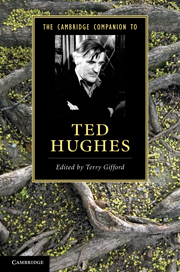Book contents
- Frontmatter
- Contents
- Acknowledgements
- Contributors
- Note on Referencing and Abbreviations
- Chronology
- Introduction
- 1 The problem of biography
- 2 The debates about Hughes
- 3 Hughes and animals
- 4 Ted Hughes and Sylvia Plath
- 5 The anthropologist’s uses of myth
- 6 Hughes’s social ecology
- 7 Hughes and feminism
- 8 Hughes and the classics
- 9 Hughes as prose writer
- 10 Hughes on Shakespeare
- 11 Class, war and the Laureateship
- 12 Hughes and his critics
- Guide to further reading
- Index
9 - Hughes as prose writer
Published online by Cambridge University Press: 28 July 2011
- Frontmatter
- Contents
- Acknowledgements
- Contributors
- Note on Referencing and Abbreviations
- Chronology
- Introduction
- 1 The problem of biography
- 2 The debates about Hughes
- 3 Hughes and animals
- 4 Ted Hughes and Sylvia Plath
- 5 The anthropologist’s uses of myth
- 6 Hughes’s social ecology
- 7 Hughes and feminism
- 8 Hughes and the classics
- 9 Hughes as prose writer
- 10 Hughes on Shakespeare
- 11 Class, war and the Laureateship
- 12 Hughes and his critics
- Guide to further reading
- Index
Summary
‘I have but an indifferent opinion of the prose-style of poets: not that it is not sometimes good, nay, excellent; but it is never the better, and generally the worse from the habit of writing verse,’ says William Hazlitt, with characteristic pugnacity, at the opening of ‘On the Prose-Style of Poets’. Composer exclusively of prose and not of poetry, Hazlitt has his own axe to grind here, but his strictures about the prose of the Romantics which follow in this essay and his opposing recommendation of the virtues of another exclusive writer of prose, Edmund Burke, are still worth attention in the way they suggest that poets can easily forget the strengths prose needs. Even if we have long since learned to admire the varied virtues of, say, Biographia Literaria and the preface to Lyrical Ballads, it is salutary to attend to Hazlitt on the magnificence of a prose style which differs from poetry ‘like the chamois from the eagle’. A poet’s style, craving ‘continual excitement’ and therefore always aspiring to the condition of the eagle, may have scant respect for the necessary agility, persistence and level-headedness of the chamois, in for the long haul.
- Type
- Chapter
- Information
- The Cambridge Companion to Ted Hughes , pp. 121 - 134Publisher: Cambridge University PressPrint publication year: 2011
- 1
- Cited by

